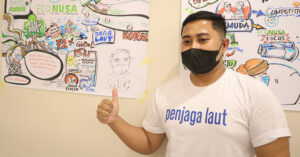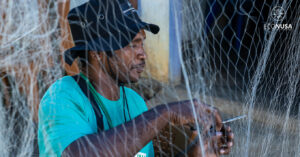
Far from Kaimana District, not all the needs of the people of Kampung Edor, Buruway District, West Papua, can be obtained easily, including basic food needs in the form of vegetables. Gradually, the people of Kampung Edor built and organized a new culture in their social system of life: agriculture.
So far, most of the people depend their lives from fishing. When using two outboard engines with a capacity of 40 PK each, Kaimana can be taken for one and a half hours from Edor Village. There, men from Edor Village sell their catches while buying household necessities.
Unfortunately, these activities have not been able to make people breathe freely. Village Head Edor Abdul Kadir Suban said, people’s income from the fisheries sector did not make household needs at a safe level. This happens because of high operational costs during fishing to fish sales.
“They are burdened with very high operational costs so that (income) can only be used to meet household needs. But it’s still lacking, “Abdul said.
According to Abdul, one trip to sea requires around 20 liters of premium fuel. The absence of electricity from the State Electricity Company makes fish preservation boost operational costs. 15 liters of diesel fuel ran out overnight to turn on two cooling salts. Lapse of 2-3 days then the fish are ready to be sold in Kaimana if collected enough.
Abdul racked his brain. He hopes that Edor Village people can cultivate land and get vegetables without having to go to Kaimana. Abdul’s hopes began when the agricultural extension service in the Agriculture Service field came to Kampung Edor. But in the end Abdul had to be disappointed because the assistance was only for a moment.
“They provide assistance in how to open land, make beds and others. But unfortunately the program did not continue so that the community was disappointed the program did not run routinely, “Abdul said.
Buying vegetables in Kaimana was once felt by Haswia Tanarubun, Chair of the Farmer Group II. Haswia buys vegetables every three days. The details, fifty thousand to buy vegetables, fifty thousand to joint venture to buy premium.
“Yes, it becomes expensive. If you want to eat vegetables, someone goes to town, you want to leave money. ‘Please buy vegetables.’ If you come down yourself, you can also buy them because they are eaten for health, Has Haswia said.
Haswia has been active in farming since November 2018. Her husband went to sea. They helped each other: Haswia gave additional energy to raise fish, while her husband sought paid wood and cultivated land.
Based on ownership, agricultural land in Edor Village is divided into two. Private land is cultivated by each household around the house. Larger farmer group land is cultivated together. There are two farmer groups representing two pillars of citizens with 15 heads of households in each group.
“For our progress, for our children, we have to farm. Better farming. More enjoyed to wear, more happy for us. We invite children to be diligent in farming. Farming is better, “Haswia said.
The farming community of Edor Village is not completely free of chemical fertilizers. Although not used to it, Haswia uses chemical fertilizers for vegetable crops such as spinach and spinach. While other plants such as beans, eggplants, jackfruit, papaya, Haswia use wood burning wood ashes.
Filling this vacancy, the EcoNusa Foundation provides agricultural assistance to achieve good agricultural practices (GAP) from land clearing to harvest. Agricultural instructor Ramadhan Nur Iman said, burning land was not a good way to start agriculture. Making terraces is necessary as a conservation measure.
The mothers are then gathered in an Edor Public Elementary class to get basic knowledge about the types of nutrients: macro nutrients and micro nutrients. “With this understanding, land burning is expected to be reduced with the aim of maintaining the availability of micro nutrients in the soil,” Ramadhan said.
To prevent the entry of pests, the land is surrounded by kitchen lemongrass (Cymbopogon citratus) and fragrant lemongrass (Cymbopogon nardus) with a range of each plant as far as one meter. Both of these plants have the function of pest repellent.
In addition, the mothers learned to make organic fertilizer. Compost making holes are made in each group by two times one meter. Leaf waste is put into a hole and doused with water to speed up the process of leaf decay. The hole is covered with banana leaves to retain moisture.
The mothers also received training on how to make vegetable pesticides. The richness of Kampung Edor’s forest provides various materials needed: soursop leaf (Annona muricata), papaya leaf (Carica papaya L.), orange leaf (Citrus sp.), Tuba root (Derris elliptica), fart leaf (Paederia scandens), ciplukan (cucumber leaf) Physalis angulata), and suren leaves (Toona sinensis).
Nurhaida Yagana, Chair of the Farmers Group I, said she would be more diligent in overseeing agricultural land. The plan, he will install a wooden fence to avoid the entry of wild pigs damage spinach, kale, mustard greens, keys, and long beans of hers.
Agriculture in Edor Village has just begun, even though Abdul (Edor Village Head) has the determination to look at the future of its citizens. “The community can consume a lot of vegetables so that there is an increase in nutrition for the children of Edor village,” Abdul said. In addition to the nutritional benefits and improving the household economy, Abdul hopes that the agricultural output of Edor Village can compete in the Kaimana Market.




